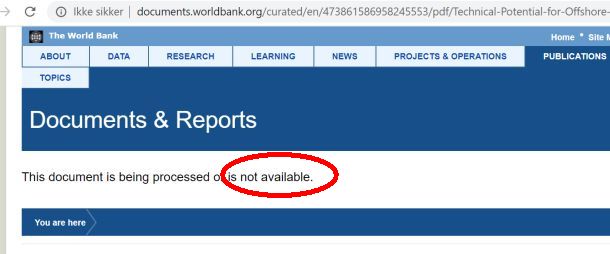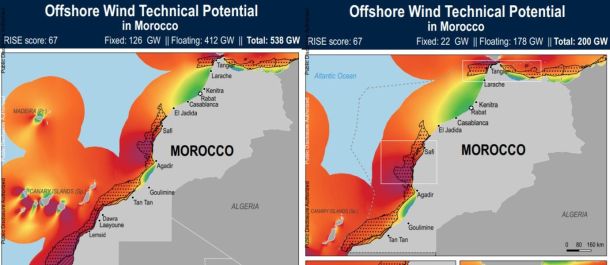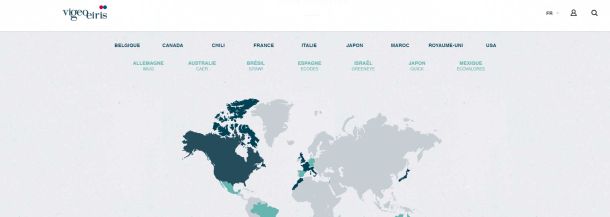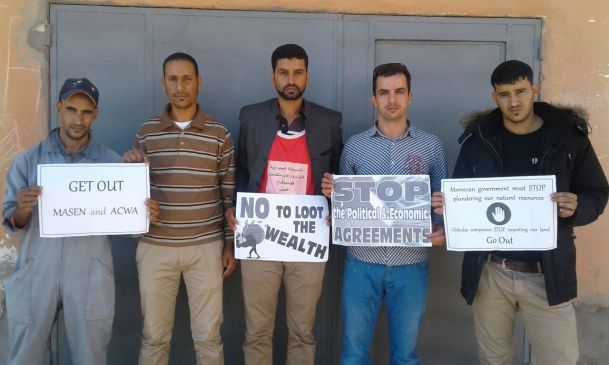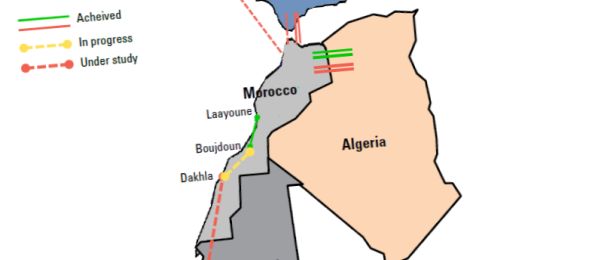
A case study on Morocco's policy reforms regarding renewable energy by a UN agency completely ignores the fact that a significant share of Morocco's planned production will come from occupied Western Sahara, as it fails to even distinguish between the two territories.
Above picture: one of the many maps - courtesy of Morocco's national electricity agency - depicting Western Sahara as part of Morocco, that were included in UNESCWA's report on Morocco's renewable sector.
WSRW has today called upon the UN Economic and Social Commission for Western Asia (UNESCWA) to rescind its "case study on policy reforms to promote renewable energy in Morocco", as the report fails to distinguish between the territory of Morocco and that of Western Sahara, and as such goes against the UN stance on the conflict.
The report does not mention Western Sahara anywhere: not in the country brief, not in the used maps which all depict Morocco as incorporating Western Sahara, nor in the actual content. While Morocco's targets in terms of wind and solar energy are described, there is no reference at all to Morocco's solar and wind projects in the Non-Self-Governing Territory - inspite of them being substantial.
The report boasts the Moroccan Solar Plan (Noor) and the Moroccan Integrated Wind Program, but does not mention that both programs include the construction of energy-generating infrastructure in Western Sahara. The exact locations of the wind turbines or solar equipment is mentioned, but it is not explained that these towns or areas are located outside of Morocco. The Moroccan Solar Plan foresees in the construction of solar plants in Sabkhat Tah (near Western Sahara’s capital of El Aaiun) and in Boujdour. If completed, 30% of Morocco’s generated solar potential through Noor will come from Western Sahara. No less than 22.75% of the energy generated through the Moroccan Integrated Wind Program will come from wind turbines in Western Sahara. This is not mentioned anywhere in the report.
It should be noted that the UNESCWA report primarily documents Morocco’s renewable plans toward the 2020 horizon. When taking into account Morocco’s more recent plans for a 200MW wind farm in Aftissat (already being constructed) and for a 400MW farms near Dakhla, the share of production in Western Sahara out of Morocco’s total wind energy production has risen above 40%.
"It is perhaps not surprising that this report would obfuscate Morocco's green energy plans in occupied Western Sahara, as the report's author is the former Director of Renewable Energy at Morocco's state-owned electricity agency ONEE, but it is baffling that the report managed to sail through a presumed UN-review and has been published under UN-header", says Sara Eyckmans of Western Sahara Resource Watch. "We call upon UNESCWA to rescind this report, as a UN ageny should not allow itself to be used to whitewash Morocco's tactics of moroccanising Western Sahara."
In its letter to UNESCWA, WSRW raised its concerns that Morocco's development of Western Sahara's energy potential will negativily impact on the UN's attempts to broker a just and lasting peace. As the Moroccan monarchy controls the renewable sector through a string of holdings, and as all wind farms in Western Sahara are in the portfolio of a company owned by the king - why would the king have any interest in peace talks when he personally benefits from Morocco's military presence in the territory? Morocco's growing dependency on Western Sahara for its energy supply also does not bode well for a negotiated peace.
More information about Morocco's green energy plans in occupied Western Sahara can be found in WSRW's report "Powering the Plunder", published in November 2016.
World Bank removed erroneous maps
The World Bank has yesterday removed erroneous maps of Morocco that mistakenly included the non-self-governing territory of Western Sahara.
See also: World Bank in discordance with the UN on Western Sahara.
World Bank in discordance with the UN on Western Sahara
The World Bank seems to assist Morocco in promoting renewable energy projects in the occupied Western Sahara, as it fails to distinguish between the territory of Morocco and the Non-Self-Governing Territory.
Read also: World Bank removed erroneous maps
Vigeo Eiris goes back on false claim
Vigeo Eiris reports untruly about UN human rights approval
The company that certified energy infrastructure in occupied Western Sahara, claims that a UN body had found the company not to breach human rights.
